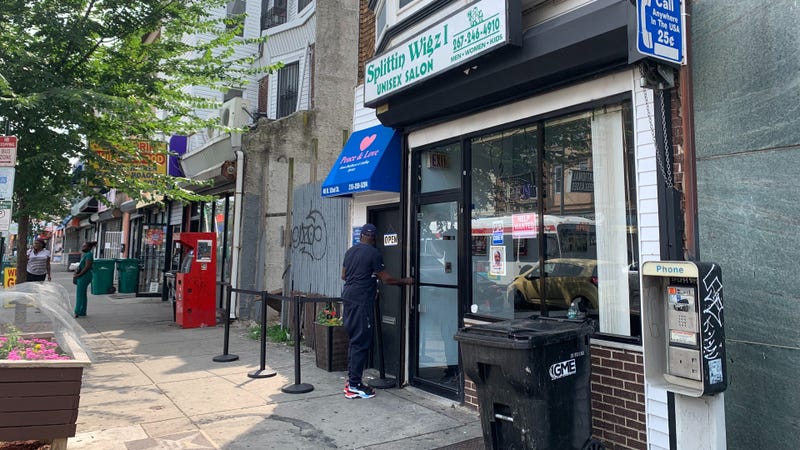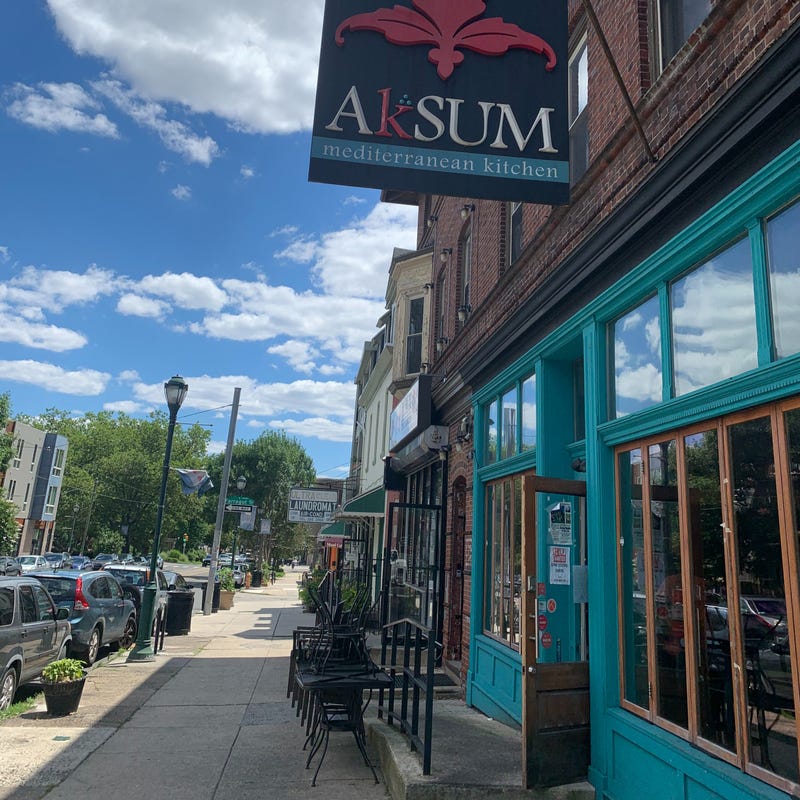KYW Newsradio's Community Comeback series checks in on Philadelphia neighborhoods and livelihoods to find out how small businesses made it through the pandemic and how they are surviving, and even thriving, today.
PHILADELPHIA (KYW Newsradio) — "I almost gave up. To be honest, I almost gave up."
John Neufville says he had to close his West Philadelphia restaurant twice during the height of the coronavirus pandemic.
"Things have been very, very tough. We lost almost everything," he said.
For the last three years, he has owned and operated Aksum Mediterranean Kitchen, 4630 Baltimore Ave. After being hampered by public health restrictions for more than a year, he says, his once-promising business in the bustling Baltimore Avenue dining corridor is now just hanging on.
"We went from making almost $370,000 in 2019 to just $20,000 in 2020," he said. "You can see the disparity."
Those same restrictions forced the closure of hair salons and barbershops across Pennsylvania. Rodney "Skinny" Harris had to lock his doors at Splittin' Wigz unisex hair salon, 48 N 52nd St. He has managed the shop for the last 28 years.
"It was hell," he said. "It was hell for at least the first six months."
And to make matters worse, he said, they were not able to get any of the coronavirus assistance loans they applied for.
"Nothin, nothing, nothing at all."
Jabari Jones, president of the West Philadelphia Corridor Collaborative, says help from the state and the city has not been where it needs to be. The average West Philadelphia business has over $8,000 in unpaid financial obligations, he said, so state and city leaders should prioritize the strategic allocation of relief funds from President Joe Biden's administration.
"Those dollars are sitting unallocated in the state's coffers and in the city's coffers. And those dollars could be doing a lot of good to help make sure that these businesses could stabilize," he said.
In West Philadelphia, Jones says he has seen a mix of businesses that have closed and others that have been able to muscle their way through.
"We've had business corridors like Lancaster Avenue that have lost 12 or more businesses over the course of the pandemic, and it's really sad," he said.
When Harris looks up and down his block of West Philly's historic 52nd Street corridor, he says its landscape, too, has changed dramatically over the last year. In the 28 years he's managed Splittin' Wigz, he has seen it all — but nothing compares to what the coronavirus pandemic put their business community through. Street vendors and restaurants that were prominent staples — and longtime friends — are now missing.
"A lot of them closed down. I would say about 50%," Harris said. "Guys I've known for years, ever since I was a kid. I don't think I'll ever see those guys again."

On Baltimore Avenue, Neufville says he has seen quite a few businesses go under, as well. But unlike Harris, he did get support from grants and loans made possible by the city, state and federal governments. That financial help and community support has helped him hold on.
However, getting money to come in is just one of the challenges he faced through the pandemic. He is also on the front lines of a labor shortage.
"To find workers has been difficult," he said. "I'm doing three person's jobs right now — as the owner, helping in the kitchen, and doing everything possible."

Neufville says he has also had to make some changes to get food to customers in the community.
"Right now we are pivoting to online marketing," he said — turning to food delivery apps like DoorDash and Caviar.
Jones says a lot of small businesses have had to innovate and adapt their business model to continue generating income through the pandemic.
"And we've seen that as vaccination rates rise, as restrictions seem to drop, we've seen a lot of customers starting to come back in full force to support local businesses," Jones said. "But we are still in a pandemic. Recovery is still something that's needed. And we need everything that we can get to make sure these businesses are going to be able to survive."
Neufville confirms that he has seen in-person sales starting to pick up. He says he is using that as a barometer of the business climate as he pushes Aksum back up the mountain.
"Things are starting to roll in a positive trend," Neufville said, "but we are still far from where we were before. But we got to be strong and continue."
Jones said one thing that will help the restaurant community is for people to put pressure on state legislators — like Reps. Rick Krajewski, who represents the Baltimore Avenue corridor, Christopher Rabb in Germantown, and Mary Isaacson in Old City — to pass a bill that would extend the pandemic-era innovations of outdoor bar service and the sale of to-go cocktails. "Which is a new revenue stream for these businesses," Jones said, "that's going to help them make up some of those losses that they incurred during the pandemic."
Harris says he has been able to build Splittin' Wigz back to something that looks like it once did before the pandemic hit, but the work to regain lost income has been bittersweet.
"It's been great, but it's still been a struggle, because we got to remember the money we lost when the pandemic happened," he said.
As they try to regain normalcy, Harris says, it makes him happy to once again take part in community activities like a back-to-school giveaway they're currently planning.
And though he may not have been able to rely on assistance from the government to ensure the future of his business, he says he has placed his faith elsewhere.
"God is going to provide, and that's all we can do, is keep on pushing, looking forward. That's it," he said.




